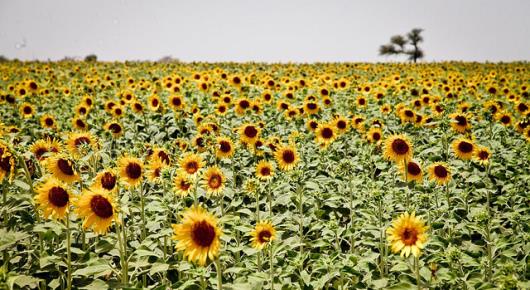Kazakhstan increasing crop area dedicated to oilseeds and pulses

Farmers in Kazakhstan have been increasing the land area devoted to growing oilseed and pulse crops – and it makes good sense from several viewpoints. An FAO-organized seminar on “Pulses and oilseeds: prospects for development” was held here today, one of many forward-looking events on offer this year at Astana EXPO 2017.
As the backbone of the rural economy, agriculture in Kazakhstan plays an important role in ensuring food security and economic sustainability of the national food system. It is one of the main factors in the country’s economic and social development, ensuring sustainable growth, rural livelihoods, and nourishment for the entire population.
“In Kazakhstan, diversification of agricultural production and continuing introduction of high-value nutritious crops demanded on world markets falls within the framework of the state programme of agriculture development for 2017-2021,” said Rustem Kurmanov, Vice Minister of Agriculture of Kazakhstan as he welcomed seminar participants.
“Over the past five years, pulses acreage in Kazakhstan has increased significantly, reaching 381 000 hectares in 2017,” Kurmanov continued. “The area for oilseeds also increased significantly, to 2.4 million hectares. The area sown to lentils is about 300 000 hectares, which is 2.8 times more than last year, putting Kazakhstan in fifth place worldwide.”
Due to their high protein content, pulses are a nutritious component in the diets of many peoples of the world and are in great demand. Vegetable proteins are cheaper than those of animal origin, which accounts for their role in providing a balanced diet for vulnerable segments of the population.
Pulses have other valuable properties, too. They enrich the soil with nitrogen, so that fertilizer use can be reduced. They require less water than other foods, and have lower levels of post-harvest losses. All of this means reduced negative impact on the environment.
“In 2016, designated the International Year of Pulses, the UN Food and Agriculture Organization launched activities worldwide with producers, consumers, national institutions, the private sector and academia to promote pulses,” said Ariella Glinni, FAO senior policy officer. “The momentum needs to be sustained, given the potential of pulses for healthy and sustainable diets and preserving the environment.”
FAO’s Regional Initiative on enhancing agrifood trade and market integration in Europe and Central Asia is supporting countries in developing capacity on international agrifood trade agreements, aligning with global food safety standards related to sanitary and phytosanitary issues, promoting access to domestic and export markets, and sustainable value chain development, Glinni added.
The results of an FAO study on the problems and prospects of production, processing and export of pulses and oilseeds in Kazakhstan were presented at the seminar.
In monetary terms, the oilseed production industry is currently estimated at US$ 411 million, or almost 4 percent of gross agricultural production, FAO national consultant Dauren Oshakbayev said. The sector has quadrupled in the past 10 years and continues to grow.
Production of pulses is also growing fast, Oshakbayev added. Gross yield has increased almost six times in a decade. Farmers continue to test new crops and in the future, the area planted to oilseed and pulse crops will assume a prominent place in the crop rotation, he concluded.
Yet, pulses still are not well known by most agricultural producers in Kazakhstan, and the share of these crops in the total cultivated area of Kazakhstan was less than one percent in 2016, according to Kairat Nazhmidenov, who heads FAO’s office in Kazakhstan.
“Constraints include agricultural producers’ insufficient knowledge of the production technology, lack or economic inaccessibility of seeds, underdeveloped storage infrastructure, and volatility of market linkages,” Nazhmidenov said. “With its unique global expertise and experience, there is plenty of scope for FAO to make a contribution in this area in Kazakhstan.
Today’s seminar at the EXPO Congress Center gathered farmers and their associations, representatives of agricultural enterprises and grain-processing companies, grain traders, the Vice Minister of Agriculture of Kazakhstan, representatives of state companies, academia and non-governmental organizations, and international FAO experts.
4 August 2017, Astana, Kazakhstan
